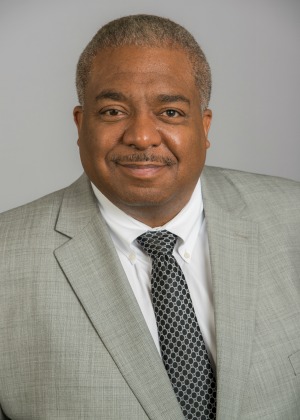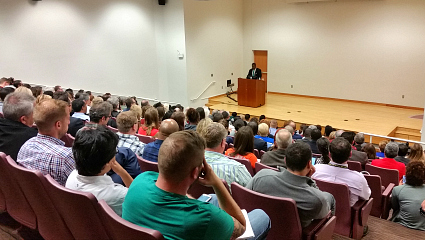Wayne State University Provost Keith E. Whitfield has been on the job for only four months, but he already has the campus community’s attention.
Whitfield spoke candidly during his first town hall meeting to a packed crowd of more than 150 on Sept. 27 in the David Adamany Undergraduate Library’s Bernath Auditorium. With all seats filled, attendees also stood in the back of the room and spilled into an overflow seating area, where more than 40 people watched outside the auditorium on closed-circuit TV.
 “The ultimate goal of holding this town hall is to have public conversations about matters of importance to our university. If it goes well, perhaps we should have another. But let’s see how this first date goes, OK?” Whitfield joked.
“The ultimate goal of holding this town hall is to have public conversations about matters of importance to our university. If it goes well, perhaps we should have another. But let’s see how this first date goes, OK?” Whitfield joked.
In his amiable speech to the university, Whitfield highlighted the importance of being a community, what he’s learned during the early part of his tenure and the goals he wants to set forth. One of the dimensions of his duties as provost, he said, is to foster and promote quality in WSU’s academic programs.
“Academic quality leads to student success, and student success is one of our primary missions,” Whitfield said. “We should have high-quality programs that students should be able to get out of in four years. Now, each student is different and some take longer than others, but our curriculum should not be the reason why it takes longer to graduate. At the same time, the curriculum should be of high quality.”
As Wayne State’s chief academic officer, Whitfield is the second-ranking executive officer and responsible for all matters related to the instructional mission of the university, student performance and retention, and academic personnel policies and decisions, among other duties.
Before coming to Wayne State, Whitfield served as vice provost for academic affairs at Duke University. An expert on aging among African-Americans, he also held Duke appointments as professor in the Department of Psychology and Neuroscience, research professor in the Department of Geriatric Medicine at Duke University Medical Center, and senior fellow in the Center for the Study of Aging and Human Development. He also was co-director of the Center on Biobehavioral Health Disparities Research.
 “I have been coming to Wayne for nearly 20 years as a member of the advisory committee for the Institute of Gerontology, so I am a longtime fan of this institution,” Whitfield said. “In an effort to learn more about our institution and for you to learn a bit more about me, I decided to hold this town hall meeting.
“I have been coming to Wayne for nearly 20 years as a member of the advisory committee for the Institute of Gerontology, so I am a longtime fan of this institution,” Whitfield said. “In an effort to learn more about our institution and for you to learn a bit more about me, I decided to hold this town hall meeting.
“I know that sometimes people in administration can seem like they are from Mars and faculty and staff are from Venus. We share common goals but sometimes different perspectives on how to achieve those goals.”
Working closely with the deans of Wayne State’s 13 colleges and schools, Whitfield said he understands that each cares about the faculty, staff, and students in their colleges and schools. But while each one has different needs and perspectives on lots of issues, he said a common denominator is that hunger for excellence and a desire to offer quality academic programs.
“One of our biggest efforts here is general education reform,” Whitfield said. “I think it’s at the heart of our goal to try and improve quality at the university. Changing general education requirements is something lots of schools have been doing for the last five to seven years. I think that’s just been one of the movements we’ve seen in higher education.”
Whitfield outlined four steps he’s experienced when considering general education reform:
- Start with a philosophy/approach to see if there is consensus.
- Examine resources that can support the proposed changes.
- Design and implement a plan that maximizes the benefit to the campus while mitigating the impact of change on faculty and students.
- Try it out and then assess to see what is working and what is not.
“I would say we are still working on step one and trying to develop step two,” Whitfield said. “While I think we need to get this done, as I think our curriculum structure for general education slows students’ progress to graduation, we need to do a thoughtful and careful development of a new curriculum. I hope that each of you chimes in when asked about what is being proposed.”